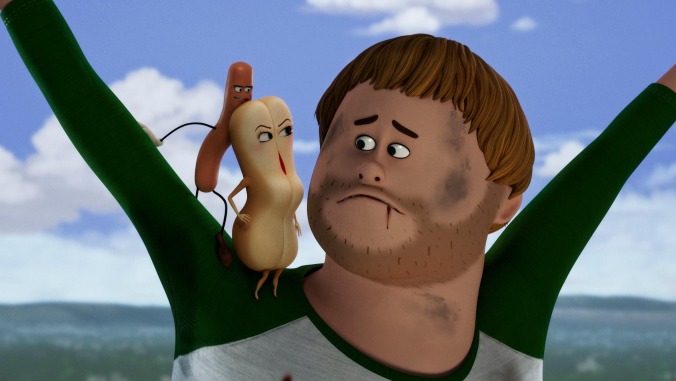Sausage Party: Foodtopia is a stale, unimaginative sequel series
Prime Video's follow-up to the 2016 film has lofty ambitions it can't match, but hey, at least the foods are less racist now

Watching 2016's Sausage Party through a 2024 lens is a fraught experience. Seth Rogen and Evan Goldberg’s anti-VeggieTales comedy is stuffed with jokes based on ethnic stereotypes associated with foods. Bottles of sauerkraut spout Nazi rhetoric in song form (the joke being some pun on “exterminating the juice”). A Black-coded character named Mr. Grits recycles Chris Rock’s “cracker-ass cracker” bit from his 1999 special Bigger And Blacker, lobbing the insult at (what else?) a box of crackers. Bill Hader portrays a Native American caricature practically copied from Disney’s Peter Pan of the ’50s and voices a bottle of tequila and a gangster named El Guaco.
The question for its sequel series is if they would double down its off-color brand of comedy or re-fire the dish entirely. After going through a Trump presidency since the original movie (and teetering on the edge of a second one), an insurrection, a rise in hate crimes, and pandemic-sown political division, it’s an important question going into Prime Video’s Sausage Party: Foodtopia, which premieres on July 11.
Well, for starters, they killed off Lavash. Kareem Abdul Lavash is a Middle Eastern flatbread voiced by David Krumholtz, who does an outrageous accent and spouts jokes evoking Islamophobic tropes. His partner, a counterpart Jewish stereotype bagel named Sammy Bagel Junior (Edward Norton), weathers this loss throughout season one. Sammy is the lone ethnic stand-in that remains. While he ends up dominating Foodtopia’s media, which has some problematic associations historically, he remains a central character with a little more nuance to his portrayal than expected (and at least the majority of the writers are Jewish, so that makes it feel more self-deprecating than xenophobic).
Except for potatoes getting profiled by the police, which emerges once economics divide up Foodtopia after a character commits a crime in “potatoface,” ethnicity isn’t brought into this. The human/food conflict isn’t even the central focus, though Sausage Party ended (and this show begins) with a full-scale apocalypse brought on by a food/ human war. The theme is more class-oriented. The movie grappled with the dangers of unchecked religious doctrine and loyalty to “gods” (in the foods’ case, humans), but this installment is about the forces that come to divide the food community: Wealth inequality, distrust, and overwork (a bold one to tackle given the labor controversy surrounding the film’s animators).
 Keep scrolling for more great stories.
Keep scrolling for more great stories.
